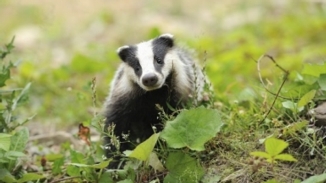
人类——獾类眼中的超级捕食者
Humans Are Superpredators in the Landscape of Fear
人类——獾类眼中的超级捕食者
Badgers were far more frightened by the sounds of humans than by their traditional predators, such as bears or wolves.
獾对人类声音的恐惧远甚于对熊或是狼等传统捕食者的声音的恐惧。
撰文/播音 Jason G. Goldman
翻译 Meatle
审校 吴非
Small carnivores—like foxes or raccoons or badgers—are themselves prey for larger predators—like wolves. So they spend time hiding instead of hunting. This influence that big predators have on their ecosystem is called a "landscape of fear." But humans are wiping out most of the world's big predators. Which you might assume is good news for the small ones.
小型食肉动物,比如狐狸、浣熊和獾,都是狼等更大的捕猎者的猎物。因此这些小动物大多时间在躲避,而不是捕食。大型捕食者对生态系统的影响被称为“恐惧光环之境”(Landscape of Fear)。然而人类的出现使大多数大型捕食者濒临灭绝,对于小型动物而言,这也许是个好消息。
But some researchers think that humans exert our own landscape of fear. Those foxes, raccoons and badgers just keep on hiding—only now, they're hiding from us. In reality, the situation may be far worse.
但是,一些研究者认为人类也有自己的“恐惧之境”。因为那些小动物在为逃离我们而四处躲藏。事实上,这种状况远比我们想象的要严重。
“Humans kill these smaller carnivores, so things like raccoons and foxes that we have here in North America, European badgers that they have in the U.K. and elsewhere in Europe, and we kill them at a rate that's four times greater than their conventional large carnivore predators…”
“人类屠戮着这些小动物,比如北美地区的浣熊和狐狸、英国和欧洲其他地区的獾,都被我们以四倍于它们在自然界的天敌的狩猎速度猎杀着。”
Liana Zanette of Western University in London, Ontario.
安大略省伦敦市西安大略大学(Western University in London, Ontario)的Liana Zanette说。
"Because our killing of these smaller carnivores is kind of off the scale, we're considered the superpredator."
“因为我们屠戮它们的速度远超想象,我们被认为是‘超级捕食者’。”
To see how humans have altered the landscape of fear, Zanette and her team traveled to a small forest that’s home to lots of European badgers near Oxford in the U.K. They used hidden speakers to broadcast the sounds of bears and wolves—two historic predators, both of which are no longer a threat. They also played the sounds of sheep, dogs and people. Hidden cameras recorded the badgers’ willingness to look for food outside of their burrows as those sounds were played.
Zanette和她的团队前往了英国牛津附近的一个小树林,以研究人类如何影响着“恐惧之境”。这个树林栖息着大量的欧洲獾。研究人员将扬声器隐匿于丛林之中,播放熊和狼的叫声,只是这些传统捕食者(因为数量原因)已经不足为惧。研究人员也播放了绵羊、犬只和人类的声音。隐蔽式摄像头在播音的同时记录下獾的活动,从而可以分析在声音播放时獾类离巢觅食的意愿。
They discovered that the badgers have retained some of their fear of bear sounds, and know that dogs still pose a threat. But they've lost their fear of wolves.
他们发现獾类对于熊叫声仍有所虑,它们也会惧怕犬类,但却完全失去了对狼的恐惧。
"They treated the wolf calls just like the sheep calls."
“它们对待狼叫声的态度就像听到了‘咩’一样。”
Despite their fear of bears and dogs, the badgers still eventually went out to eat amid their sounds. But when they heard people "they would not emerge from their burrows at all until the human sounds were completely off. So they would cower in their burrows for the two hours that the sounds were on, waiting for those human sounds to go off."
尽管獾对熊和犬只的叫声表现出恐惧,这些小动物还是在叫声中外出觅食。但是当它们听到人类的声音,“它们完全不会离开巢穴,直至人类的声音消散。因此它们会整整两个小时蜷缩在巢穴之中,静静等待人类的声音远去。”
In other words, they were leery of bears but were downright terrified of us. The findings are in the journal Behavioral Ecology. [Michael Clinchy, Liana Y. Zanette, et al. Fear of the human "super predator" far exceeds the fear of large carnivores in a model mesocarnivore]
"The badgers recognize who their enemies are…they have recognized humans as their principle threat."
换句话说,熊的出没会使它们变得警觉,而人类的出现会使它们完全退缩。该研究发表在《生物行为学学报》(Behavioral Ecology)上。“獾类能够识别出它们的敌人…它们明白人类是它们的首要威胁。”
未经书面许可任何人不得复制或镜像
京ICP备11000850号-1
 京公网安备11010502039775号
京公网安备11010502039775号 信息网络传播视听节目许可证0111611号
国家科技基础条件平台

















